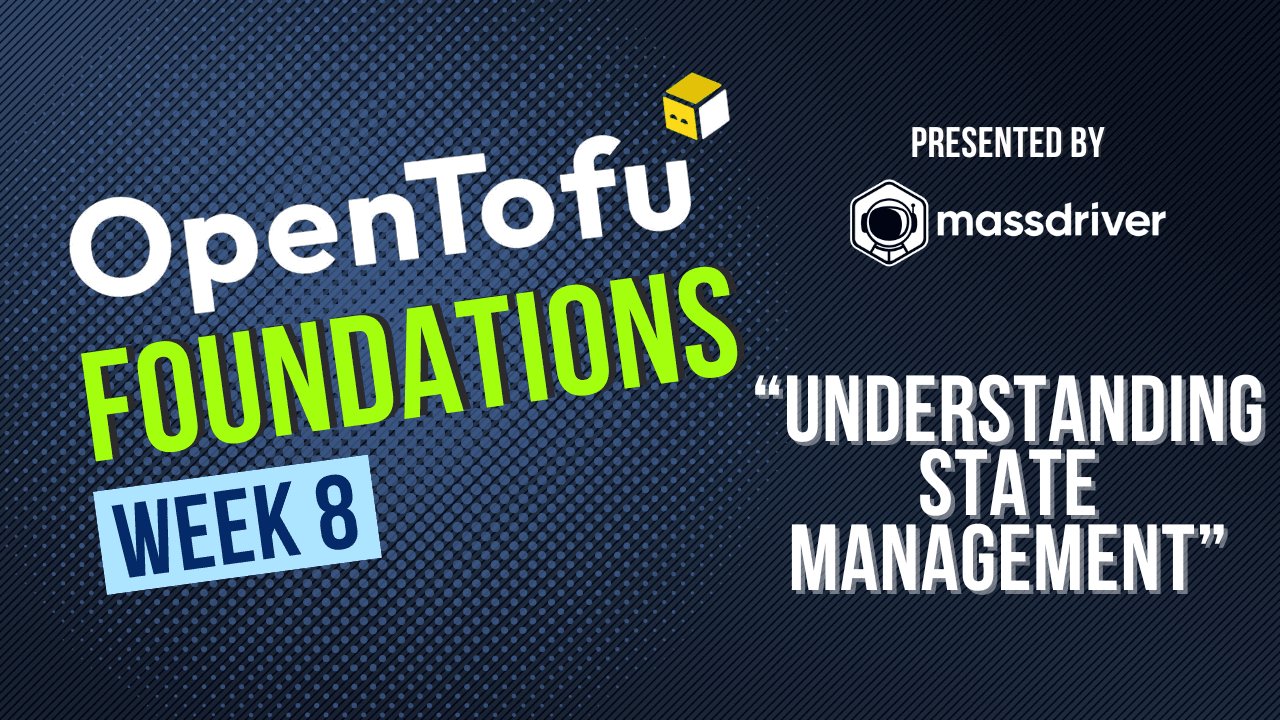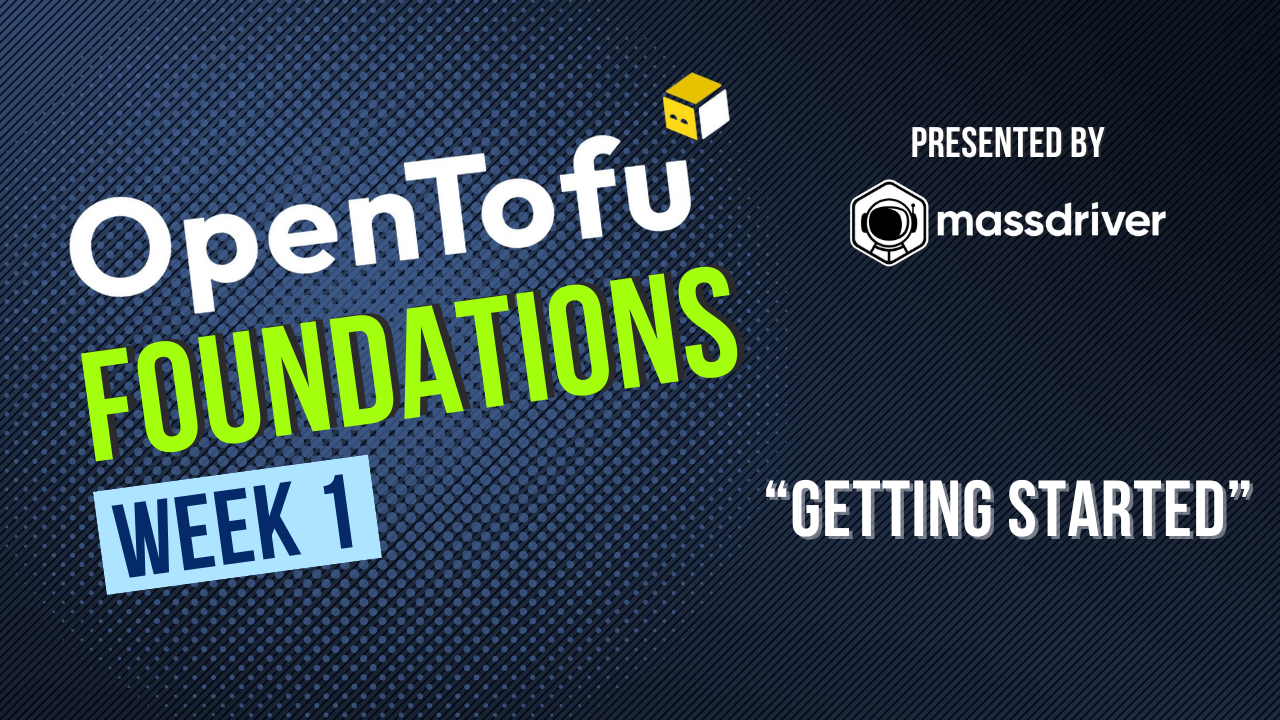OpenTofu Foundations: Understanding State Management (Part 8)
In this session, we'll delve into how OpenTofu manages the state of your infrastructure. Understanding state is crucial for effectively using OpenTofu, especially when working with teams and multiple environments. We’ll explore state files, secure storage options, and state locking strategies to ensure your infrastructure remains consistent and secure.

This is part 8 of a 10 week workshop. Check out part 7 or watch the recorded session here.
Prerequisites
- Completion of Week 5: Integrating OpenTofu into CI/CD Pipelines
- Completion of Week 7: Multi-Environment Management
What is State in OpenTofu?
In OpenTofu, state refers to the mapping between your configuration files and the real-world resources they represent. This state is maintained in a state file, typically in JSON format, which records the metadata about your infrastructure. OpenTofu uses this state to track resource attributes, dependencies, and to plan updates accurately.
The Importance of State
State is essential because it allows OpenTofu to:
- Map Configuration to Real Resources: Understand which resources in your configuration correspond to actual resources in your cloud provider.
- Track Metadata and Dependencies: Keep track of resource dependencies and metadata, ensuring resources are created or destroyed in the correct order.
- Improve Performance: Cache resource attributes to reduce the need for querying cloud providers on every operation.
Without state, OpenTofu wouldn’t know the current status of your infrastructure, leading to potential inconsistencies and conflicts.
Local State Storage
By default, OpenTofu stores the state locally in a file named terraform.tfstate. This file resides in the directory where you run your OpenTofu commands.
Advantages
- Simplicity: Easy to set up without additional configuration.
- Quick Start: Ideal for initial development and learning phases.
Challenges with Local State
While local state storage is straightforward, it poses several challenges:
- Collaboration Issues: Difficult to share state among team members, leading to potential conflicts and overwrites.
- Lack of Security: Sensitive information in the state file could be exposed if not handled properly.
- No State Locking: Multiple users might run OpenTofu commands simultaneously, causing state corruption.
- Recovery Difficulties: Losing the local state file can make it challenging to recover and manage existing resources.
Remote State Storage
To overcome the limitations of local state storage, OpenTofu supports remote state backends. Remote backends store your state file in a shared and secure location, enabling collaboration and state locking.
Supported Backends
OpenTofu supports various remote backends, including:
- Amazon S3
- HashiCorp Consul
- Azure Blob Storage
- Google Cloud Storage
- Alibaba Cloud OSS
- Kubernetes
- PostgreSQL
Configuring Remote State
To configure a remote backend, update your OpenTofu configuration with a backend block:
terraform {
backend "s3" {
bucket = "your-state-bucket"
key = "path/to/your/statefile.tfstate"
region = "us-west-2"
encrypt = true
dynamodb_table = "your-lock-table"
}
}
- bucket: The name of your remote storage bucket.
- key: The path within the bucket where the state file is stored.
- region: The region of your remote storage.
- encrypt: Enables server-side encryption of the state file.
- dynamodb_table: (For AWS S3 backend) Specifies a DynamoDB table for state locking.
Secure Storage
State files often contain sensitive information such as resource configurations, metadata, and output values that may expose secrets or credentials. Ensuring secure storage for your state files is essential, especially in team environments.
Security Practices
- Encryption: Enable encryption for state files in remote backends. For example, in the AWS S3 backend, setting
encrypt = trueensures server-side encryption. - Access Controls: Use access controls to limit who can view or modify the state file.
- Versioning: Enable bucket versioning for state rollback.
- Audit Logs: Enable logging for your storage backend (e.g., AWS CloudTrail for S3) to track access and modifications to state files.
Enabling encryption
OpenTofu supports encrypting both state and plan files at rest, for both local storage and when using a remote state backend. Since we've already configured a remote state backend using AWS S3, I'll list out those steps below. For a full guide on encrypting state and plan files wherever they are stored, click
here
- Enable bucket versioning by updating your module, then run
tofu apply(Might need to runtofu init --upgradeif you already have thestatemodule installed):
module "state" {
source = "github.com/massdriver-modules/otf-shared-modules//modules/opentofu_state_backend?ref=main"
name_prefix = var.name_prefix
enable_versioning = true
}
- Set
encrypt = truein yourbackendblock:
backend "s3" {
bucket = "my_bucket" # your bucket name here
key = "path/to/terraform.tfstate" # Change the path per root module
dynamodb_table = "my_dynamo_table" # your dynamo table name here
region = "us-west-2"
encrypt = true
}
- Run
tofu initto initialize the changes. - Run
tofu planto ensure no breaking changes. - Repeat steps 2 - 4 only for your wordpress app.
State Locking
State locking prevents concurrent operations that could lead to state corruption. When state locking is enabled, OpenTofu locks the state file during operations that modify it.
Why State Locking Matters
- Prevents Conflicts: Ensures that only one operation can modify the state at a time.
- Maintains Consistency: Avoids race conditions and conflicting resource changes.
- Enhances Collaboration: Multiple team members can work safely without stepping on each other’s toes.
Implementing State Locking
Most remote backends support state locking. For example, when using AWS S3, you can enable state locking with a DynamoDB table:
terraform {
backend "s3" {
# ... other configurations
dynamodb_table = "your-lock-table"
}
}
OpenTofu will automatically lock the state when performing operations. If it can’t acquire a lock, it will wait or exit based on your configuration.
Force Unlocking State
If a lock persists due to an interrupted process, you can forcefully unlock the state:
tofu force-unlock LOCK_ID
LOCK_ID: The unique identifier of the lock, provided in the error message when locking fails.
Use force unlock cautiously, as it can lead to multiple concurrent modifications if misused.
State Locking for Multiple Environments
When managing multiple environments (e.g., development, staging, production), each environment typically has its own isolated state to prevent cross-environment conflicts. OpenTofu’s state locking extends across all environments configured with remote state backends that support locking.
Using Workspaces with State Locking
OpenTofu workspaces allow each environment to maintain a separate state file under the same backend configuration. When combined with state locking, each workspace’s state file remains locked during operations, ensuring safe and isolated state management across environments.
Creating a New Workspace
tofu workspace new staging
Selecting a Workspace
tofu workspace select staging
Each workspace has its own independent state file, which supports consistent state management practices for multiple environments.
Best Practices for State Management
- Use Remote Backends: Always prefer remote backends for state storage in team environments.
- Enable State Locking: Ensure that your backend supports and has state locking enabled.
- Separate States Per Environment: Use workspaces or separate backends to isolate states across environments.
- Secure Your State Files: Enable encryption and restrict access to sensitive state information.
- Avoid Manual State Edits: Use
tofu statecommands for state manipulations instead of editing the state file directly. - Backup State Files: Regularly backup your state files to prevent data loss.
- Automate with Caution: When automating OpenTofu operations, handle state locks and failures gracefully.
TACOS
TACOS (TF Automation and Collaboration Software) platforms provide teams with essential tools for managing, orchestrating, and securing OpenTofu execution at scale. These solutions, which come in both open-source and commercial forms, enable teams to version, encrypt, and securely share OpenTofu’s state files. State management is critical for tracking how configurations map to real-world resources, handling metadata, and ensuring operational consistency in complex infrastructures. TACOS streamline this process, making it easier for teams to collaborate effectively and confidently adopt Infrastructure as Code (IaC) practices.
At Massdriver, we offer a TACOS platform that enhances cloud infrastructure management by allowing developers to work through simple, intuitive diagrams that are powered by IaC modules and policies defined by operations teams. This approach combines the convenience of ClickOps with the benefits of version control, reproducibility, and policy enforcement, ensuring that cloud management is both accessible and reliable for teams across an organization.
Challenges
- Create Multiple Workspaces: Set up
development,staging, andproductionworkspaces. Deploy resources in each and observe the state segregation. - Implement Workspace-Specific Configurations: Use the
terraform.workspacevariable to customize resource attributes per workspace. - Test State Locking: Simulate concurrent OpenTofu operations to see how state locking prevents conflicts.
- Force Unlock State: Practice using
tofu force-unlockin a controlled environment to understand its implications.
Don't forget to tear down your resources!
Conclusion
Understanding and managing state is fundamental to effectively using OpenTofu. By securely storing state files, implementing state locking, and properly organizing states across multiple environments, you can ensure consistent and reliable infrastructure deployments. These practices not only enhance collaboration within teams but also safeguard your infrastructure from potential conflicts and inconsistencies.
Feel free to reach out on our community Slack channel if you have any questions or need further assistance!
.png)



